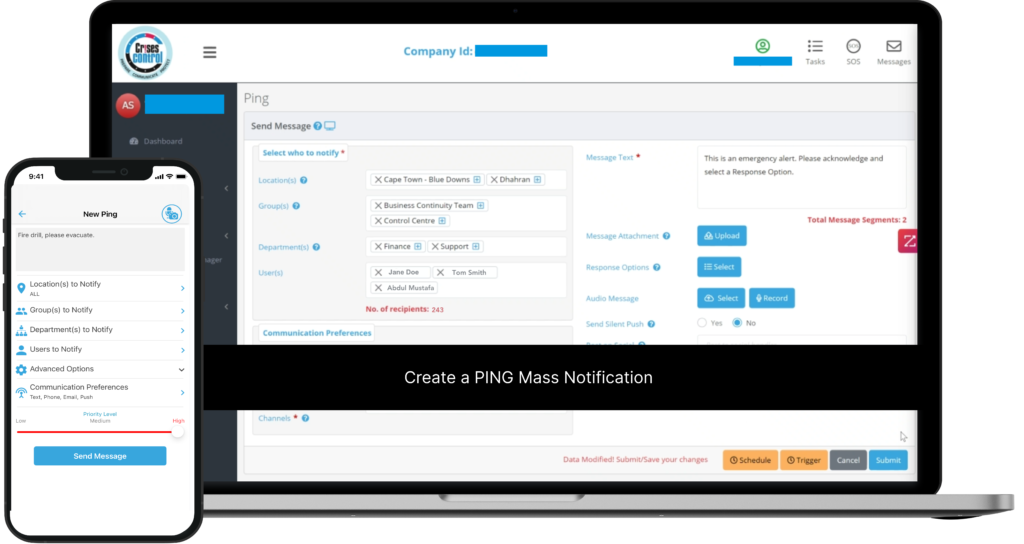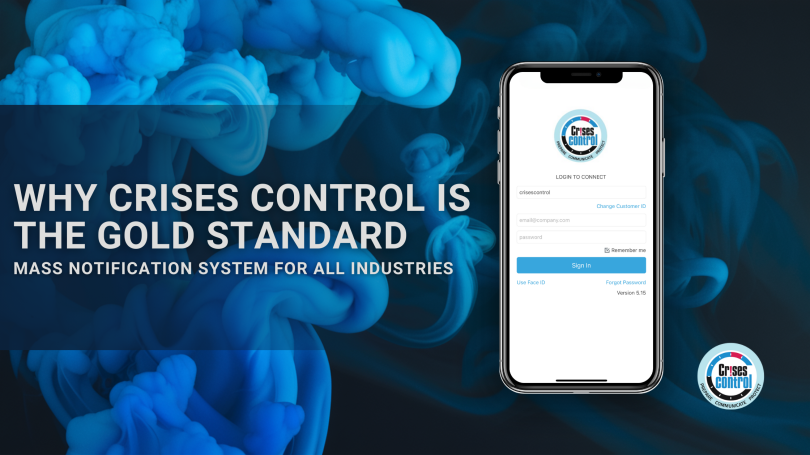Written by Anneri Fourie | Marketing Executive
In the fast-paced world of high-stakes industries, emergencies can strike at any moment. Whether it’s a severe weather event, a security breach, or a technical failure, the ability to communicate clearly and quickly is crucial. For industries like aviation, oil and gas, and education, the stakes are even higher, where delays or miscommunication can have devastating consequences.
A Mass Notification System isn’t just a technological add-on; it’s a critical component of a robust crisis management strategy. Crises Control has established itself as a leader in this space, offering a system that is fast, reliable, and designed to handle the unique challenges of high-pressure industries.
In this blog, we’ll explore the importance of mass notification systems, the specific challenges faced by key industries, and how Crises Control delivers a solution that empowers organisations to stay resilient during emergencies.
What is a Mass Notification System, and Why Does it Matter?
Emergencies require organisations to act quickly, but without a structured communication system, even the best plans can fall apart. A Mass Notification System ensures that critical messages reach the right people at the right time using multiple communication channels.
Here’s why they’re essential:
- Speed Saves Lives: Quick communication reduces confusion, allowing teams to respond effectively.
- Minimising Disruption: Keeping everyone informed helps maintain order during chaotic situations.
- Regulatory Compliance: Many industries are required to have robust communication systems to meet safety standards.
Unlike traditional systems, a modern mass notification platform integrates seamlessly with incident management tools, making it a powerful resource for managing complex crises.
Challenges in High-Stakes Industries
Each industry faces unique hurdles during emergencies, making it critical to have a tailored mass notification system.
1. Aviation: Managing Complex Operations
The aviation sector involves intricate operations with numerous stakeholders, including passengers, staff, and external agencies. A single incident, such as a weather delay or a runway closure, can disrupt thousands of lives. a Mass notification system is vital to:
- Notify passengers about changes and alternative arrangements.
- Coordinate with emergency services during security incidents.
- Keep airline staff updated on operational changes.
Without a reliable system, confusion can lead to passenger dissatisfaction, operational delays, and reputational damage.
2. Oil and Gas: Operating in High-Risk Environments
Oil and gas companies operate in some of the most challenging environments on the planet. From offshore rigs to remote drilling sites, the risk of fires, spills, and equipment failures is ever-present. Effective communication is key to:
- Alerting staff to evacuate or take protective measures.
- Notifying emergency responders to take immediate action.
- Minimising damage to the environment and infrastructure.
Given the remote nature of many operations, communication systems must be robust enough to function even in areas with limited connectivity.
3. Education: Ensuring Campus Safety
From primary schools to universities, the education sector faces increasing security challenges. Whether it’s a natural disaster or a potential threat to safety, schools need a mass notification system to:
- Notify staff and students of lockdowns or evacuations.
- Communicate quickly with parents to provide updates.
- Coordinate with security teams to manage the situation.
Timely and accurate messaging ensures the safety of students and staff while helping parents remain informed and reassured.
How Crises Control Solves These Challenges
Crises Control has been designed to address the unique needs of high-stakes industries. Here’s how:
1. Multi-Channel Communication
Crises Control’s Ping Mass Notification System ensures that messages are delivered via multiple channels, including SMS, email, mobile app notifications, and voice calls. This guarantees:
- Messages reach recipients regardless of their location or preferred communication method.
- Redundancy in case one channel fails, ensuring critical updates are never missed.
2. Incident Management Integration
Unlike standalone notification tools, Crises Control integrates incident management capabilities. This enables:
- Real-time collaboration between teams, reducing decision-making delays.
- Clear task assignments to ensure everyone knows their role.
- A seamless transition from sending alerts to managing the crisis.
3. Scalability for Any Industry
Crises Control’s mass notification system is highly adaptable, allowing organisations to create custom templates and workflows. Whether you’re managing a small educational institution or a global oil and gas operation, the system scales to meet your needs.
4. Built for Reliability
Powered by its own cloud infrastructure, Crises Control ensures high availability 24×7/365, even during widespread disruptions. Unlike systems that rely on external providers, this infrastructure provides:
- A reliable platform for uninterrupted communication.
- The confidence that your system will work when you need it most.
5. Advanced Reporting and Analytics
After an incident, analysing what went well and what could be improved is critical. Crises Control’s reporting tools provide:
- Detailed logs of communication activity.
- Insights into response times and effectiveness.
- Data to support compliance with industry regulations.
Interested in our Ping Mass Notification System?
Efficiently alert everyone in seconds at scale with our Mass Notification System – PING, get the message out fast and ensure rapid response and recovery.

What Makes Crises Control the Gold Standard?
Crises Control isn’t just a tool; it’s a comprehensive solution designed with user needs in mind. Here are the standout features that make it the gold standard in mass notification systems:
User-Friendly Interface
The system is intuitive and easy to use, ensuring that even non-technical staff can operate it during high-pressure situations.
24/7 Accessibility
Whether you’re at a desk or on the move, the mobile app ensures that you can send alerts and manage incidents from anywhere.
Tailored Solutions
Crises Control offers customisation options to suit the specific needs of your industry, providing a truly bespoke experience.
Global Reach with Local Support
Designed to serve organisations worldwide, Crises Control also provides support tailored to local needs, ensuring compliance and effectiveness wherever you operate.
Benefits of Partnering with Crises Control
- Minimised Downtime: Rapid communication ensures business continuity during crises.
- Improved Safety: Keeps everyone informed, reducing risks and ensuring compliance with safety standards.
- Boosted Preparedness: Incident simulation tools help organisations stay ready for any situation.
- Peace of Mind: Knowing you have a reliable system in place helps leaders focus on solutions, not logistics.
How to Strengthen Your Crisis Management Today
Emergencies demand clear communication and quick action. Crises Control provides the tools to make that possible, helping organisations navigate crises with confidence.
Ready to take control of your emergency communications? Contact us today for a free personalised demo and discover how Crises Control can transform your crisis management strategy.
Request a FREE Demo









